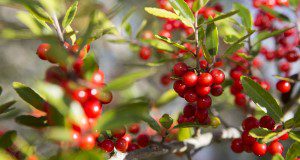This series of Key Plant, Key Pests publications are designed for Florida gardeners, horticulturalists, and landscape professionals to help identify common pests associated with common Florida flora. This publication, the eighth in the Key Plant, Key Pests series, helps identify the most common pests found on Holly (Ilex sp.). This publication provides information and general management recommendations for Florida wax scale, tea scale, Cylindrocladium leaf spot, dieback, Sphaeropsis gall, root knot nematodes, and magnesium deficiency. This five-page document was written by Juanita Popenoe, Caroline R. Warwick, Jacqueline Bourdon, and Liz Felter and published by the UF/IFAS Department of Environmental Horticulture.
http://edis.ifas.ufl.edu/ep566
Tag: Holly
Hollies at a Glance (ENH42/MG021)
 Hollies are reliable, low-maintenance plants for Florida landscapes. Diverse sizes, forms, and textures exist, ranging from large trees to dwarf shrubs. Some hollies can be used as informal or formal hedges or as foundation plants, while others make beautiful accent or specimen plants. Many are valued for their colorful berries, which provide food for birds and brighten the fall and winter seasons. Several hollies are native to Florida. This 5-page fact sheet includes a list of dozens of popular hollies sold in Florida. Written by Sydney Park Brown, Dewayne L. Ingram, and William E. Barrick, and published by the UF Department of Environmental Horticulture, March 2012.
Hollies are reliable, low-maintenance plants for Florida landscapes. Diverse sizes, forms, and textures exist, ranging from large trees to dwarf shrubs. Some hollies can be used as informal or formal hedges or as foundation plants, while others make beautiful accent or specimen plants. Many are valued for their colorful berries, which provide food for birds and brighten the fall and winter seasons. Several hollies are native to Florida. This 5-page fact sheet includes a list of dozens of popular hollies sold in Florida. Written by Sydney Park Brown, Dewayne L. Ingram, and William E. Barrick, and published by the UF Department of Environmental Horticulture, March 2012.
http://edis.ifas.ufl.edu/mg021
